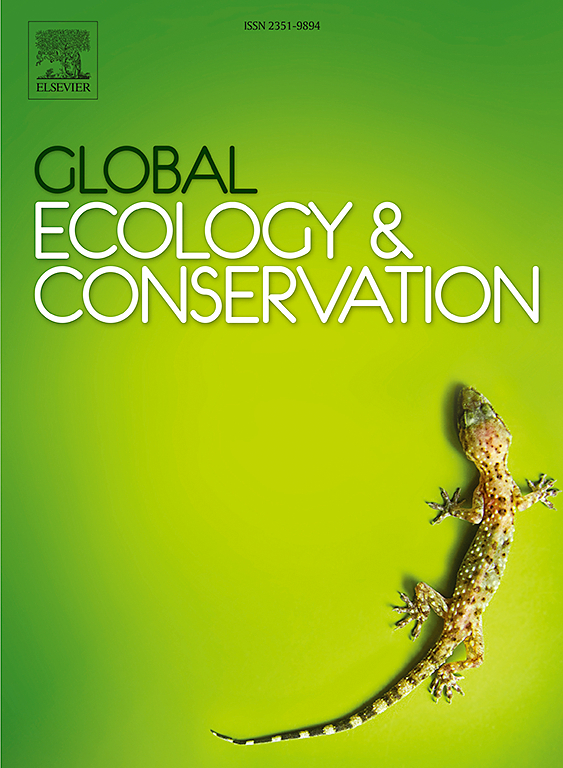Global systematic review of the factors influencing shark bites
IF 3.5
2区 环境科学与生态学
Q1 BIODIVERSITY CONSERVATION
引用次数: 0
Abstract
Shark bites can cause substantial socio-economic and ecological challenges, including debates about bite-mitigation policies, economic impacts for tourism-dependent communities, and increased fear among beachgoers. The growing frequency of shark bites globally has not only raised public concern but also intensified the need for comprehensive research into their causes. Using the 2020 PRISMA standards, we conducted a systematic review to synthetize current knowledge on factors influencing shark bites. We found that research on shark-bite determinants began in 1948 and has gained increased attention since the mid-2000s. Our search protocol identified 61 peer-reviewed articles proposing 40 factors likely influencing shark bites. These factors included 22 short-term factors, e.g. likely explaining short spates of shark bites, 13 long-term factors, e.g. addressing changes in the number of shark bites over decades, and 5 factors influencing both short- and long-term scales. Key suggested factors were changes in human and shark population dynamics, environmental conditions, prey availability, shark-bite mitigation measures, and coastal urbanization. However, most factors were speculative, with only five studies since 1948 statistically testing the correlation between shark bites and merely eight factors. Furthermore, there was a lack of consensus among studies on the effects of most factors. Our review therefore highlights the wide range of factors potentially influencing shark-bite occurrences worldwide while revealing a paucity of rigorous scientific evidence. It emphasizes the critical need for further studies to formally test shark bite determinants, providing decision-makers actionable insights to develop effective strategies that reduce shark-bite risks while enhancing both human safety and shark conservation.
影响鲨鱼咬伤因素的全球系统综述
鲨鱼咬伤会造成重大的社会经济和生态挑战,包括关于咬伤缓解政策的辩论,对依赖旅游业的社区的经济影响,以及海滩游客日益增加的恐惧。全球鲨鱼咬人事件日益频繁,这不仅引起了公众的关注,而且也加强了对其原因进行全面研究的必要性。利用2020年PRISMA标准,我们对影响鲨鱼咬伤因素的现有知识进行了系统综述。我们发现,对鲨鱼咬伤决定因素的研究始于1948年,自2000年代中期以来得到了越来越多的关注。我们的搜索方案确定了61篇同行评议的文章,提出了40个可能影响鲨鱼咬伤的因素。这些因素包括22个短期因素,例如可能解释鲨鱼咬伤的短期周期,13个长期因素,例如解决几十年来鲨鱼咬伤数量的变化,以及5个影响短期和长期尺度的因素。关键因素包括人类和鲨鱼种群动态变化、环境条件、猎物可得性、鲨鱼咬伤缓解措施和沿海城市化。然而,大多数因素都是推测性的,自1948年以来,只有5项研究从统计上测试了鲨鱼咬伤与8个因素之间的相关性。此外,对大多数因素影响的研究缺乏共识。因此,我们的审查强调了可能影响全球鲨鱼咬伤事件的各种因素,同时揭示了严格的科学证据的缺乏。它强调了进一步研究的迫切需要,以正式测试鲨鱼咬伤的决定因素,为决策者提供可操作的见解,以制定有效的策略,减少鲨鱼咬伤风险,同时加强人类安全和鲨鱼保护。
本文章由计算机程序翻译,如有差异,请以英文原文为准。
求助全文
约1分钟内获得全文
求助全文
来源期刊

Global Ecology and Conservation
Agricultural and Biological Sciences-Ecology, Evolution, Behavior and Systematics
CiteScore
8.10
自引率
5.00%
发文量
346
审稿时长
83 days
期刊介绍:
Global Ecology and Conservation is a peer-reviewed, open-access journal covering all sub-disciplines of ecological and conservation science: from theory to practice, from molecules to ecosystems, from regional to global. The fields covered include: organismal, population, community, and ecosystem ecology; physiological, evolutionary, and behavioral ecology; and conservation science.
 求助内容:
求助内容: 应助结果提醒方式:
应助结果提醒方式:


